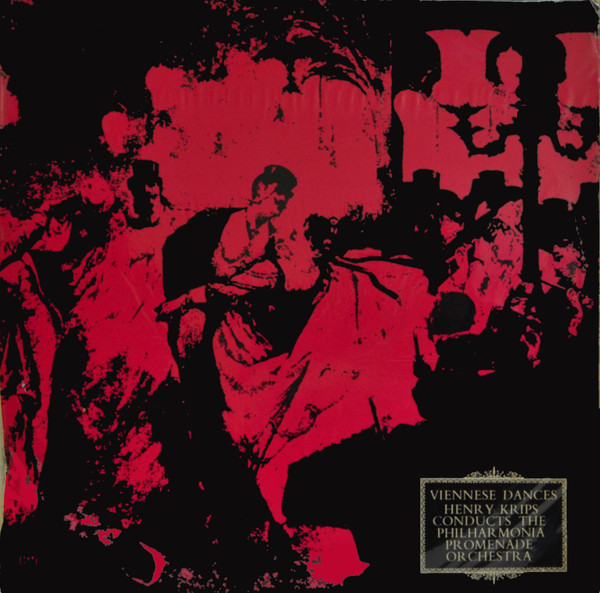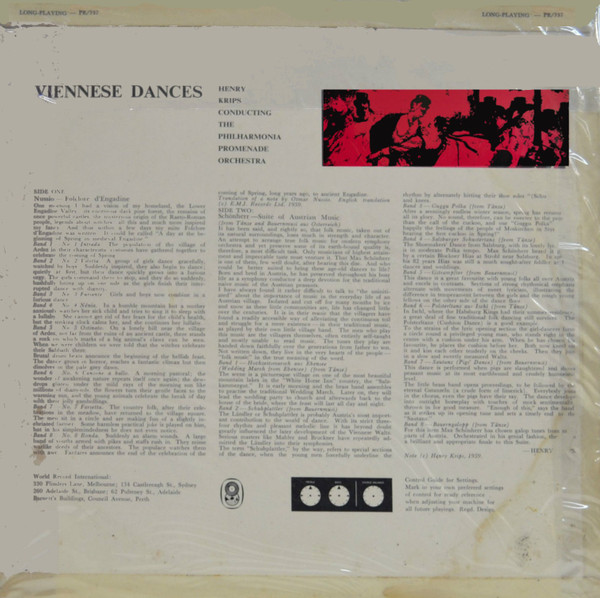Henry Krips Conducts The Philharmonia Promenade Orchestra - Viennese Dances
Download
Filename: henry-krips-conducts-the-philharmonia-promenade-orchestra.zip- MP3 size: 118.8 mb
- FLAC size: 635.4 mb
Table of Contents
Tracks
| Track | Duration | Preview |
|---|---|---|
| 1st Movement: Intrada | ||
| 1st Movement: Hochzeitsmarsch Aus Ebensee | ||
| 5th Movement: Gstrampfter | ||
| Folklore D'Engadine | ||
| 3rd Movement: Furiante | ||
| 6th Movement: Polsterltanz Aus Ischl | ||
| 4th Movement: Nénia | ||
| 2nd Movement: Schuhplattler | ||
| Suite Of Austrian Music | ||
| 2nd Movement: Vilotta | ||
| 6th Movement: Canzone A Ballo | ||
| 3rd Movement: Gugga Polka | ||
| 4th Movement: Salzburger Schustertanz | ||
| 7th Movement: Sautanz | ||
| 5th Movement: Ostinato | ||
| 7th Movement: Farsetta | ||
| 8th Movement: Ronda | ||
| 8th Movement: Bauerngalopp |
Images


Catalog Numbers
- PE 737, PE-737
- SPE-737, PE 737
Labels
World Record ClubListen online
- écouter en ligne
- escuchar en línea
- kuunnella verkossa
- lytte på nettet
- lyssna på nätet
- online luisteren
- ascolta in linea
- ouvir online
- online anhören
Formats
- Vinyl
- LP
- Album
- Club Edition
- Mono
- Stereo
Companies
| Role | Company |
|---|---|
| Record Company | World Record International |
Credits
| Role | Credit |
|---|---|
| Composed By | Max Schönherr (tracks: B1-B8), Remigio Nussio (tracks: A1-A8) |
| Conductor | Henry Krips |
| Liner Notes | Henry Krips |
| Orchestra | Philharmonia Promenade Orchestra |
Notes
- Australian WRC pressing, sourced from original stampers and featuring unique sleeve art. Mono and stereo versions have an identical sleeve and the same number on the back (PE 737) - the mono version has "PE-737" on beige 'strobe' labels, while the stereo has "SPE-737" on green 'strobe' labels. The stereo was issued with a large "S" sticker on the front of the sleeve.
- Issued as a 'dividend' release, offered at a low price (15 shillings, instead of the regular 35) for club members who had bought one LP or more in the previous 12 months. Available until the end of 1964 - may have gone through address changes (Sydney and Brisbane) on the sleeve in that time.
- World Record International:
- 330 Flinders Lane, Melbourne
- 134 Castlereagh St., Sydney
- 260 Adelaide St., Brisbane
- 62 Pulteney St., Adelaide
- Barnett's Buildings, Council Avenue, Perth
About Henry Krips Conducts The Philharmonia Promenade Orchestra
Austrian-Australian conductor, composer and pianist, born 10 February 1912 in Vienna, died 25 January 1987 in Adelaide.
From the Australian dictionary of Biography:
Educated at the Vienna Conservatory of Music and Vienna University, he made his conducting début at the citys Burgtheater in 1932. Further appointments followed at Innsbruck and Salzburg, at the Vienna Volksoper and at open-air festivals. He also composed an opera, Fiordaliso (1936). Although Kripss parents were both Catholic, he had Jewish ancestry. On 3 September 1938 in Vienna he married Luise Pauline Deutsch; they migrated to Australia, arriving in Sydney in November.
Now calling himself Henry, Krips soon found work in the music industry. He composed and directed the scores for several Australian films, including Gone to the Dogs (1939), Come up Smiling (1939), Dad Rudd, M.P. (1940) and The Power and the Glory (1941). For the Kirsova Ballet, he wrote the music for Faust (1941) and The Revolution of the Umbrellas (1943) and provided piano accompaniment for performances. In 1942-43 he was employed as musical director with George Patterson Pty Ltds radio unit. He was naturalised on 10 July 1944. That year he conducted the Australian Broadcasting Commissions Sydney Symphony Orchestra during the opera season presented by the newly formed Krips-de Vries Grand Opera Company.
In 1946-48 Krips conducted the Sydney Symphony Orchestra, and the Sydney Light Symphony Orchestra at its Music for Millions concerts. He was appointed conductor of the Perth Symphony Orchestra in 1948. Described by a critic, Raymond Bowers, as a `powerhouse of enthusiasm, he promised to perform `Mahler, Britten, Bax, Bruckner, a pageant of composers known only to Perth from recordings and hearsay. He wrote the music for the films Smithy (1946) and Charles Chauvels epic Sons of Matthew (1949).
In 1949 Krips became resident conductor of the newly constituted South Australian Symphony Orchestra. Over the following years, with his customary energy and enthusiasm, he raised it to a very high standard. He also performed as guest-conductor in other States. Six ft tall, with fair hair and blue eyes, he was a charming personality, both on and off the concert platform. He wrote music, winning prizes for several compositions: Land of Mine, a national song (1951); Southern Intermezzo, a piece for the saxophone (1956); and Kirribilli, a light orchestral composition (1959). In 1953 he took leave for nine months to study trends in music in Britain and Europe, and to conduct orchestras in Vienna and London. Further leave was granted in 1955 and 1957; eventually Krips spent a part of each year overseas, where he conducted many leading British and European orchestras at concerts, operas and recording sessions. He developed his skills and reputation as a conductor and took back to Australia orchestral works that had never been performed there before. Credited with introducing Australian audiences to Mahler, in 1963 he was awarded honorary membership of the International Gustav Mahler Society, Vienna. In 1967 the president of Austria conferred on him the title of professor `in recognition of his outstanding work for Austrian music in Australia. He was appointed MBE in 1970. After retiring in March 1972, Krips continued to work as a guest-conductor in Australia and overseas, making appearances in Korea (1978) and Canada (1979).
Real Name
- Heinrich Josef Krips
Name Vars
- H. Kripps
- H. Krips
- Henri Kripps
- Krips
Related albums
Top Albums
Soul Puncherz Featuring Lauren Rochelle - Adrenaline Rush
Ljute Papričice I Dragana Vidosavljević - Ljute Papričice
Gene Austin - Aint She Sweet What Do I Care What Somebody Said

Micro - 25th Year Micro Rock Lek Lek
Various - Davulun Sesi Vol1
Potential differenSe - Sega System
Sonny Terry Sonny Terry And Oh Red - Harmonica Blues Harmonica And Washboard Breakdown
Aufklärung - Di La TempestaLOscuro Piacere
W B Yeats Jim Norton, Denys Hawthorne, Nicholas Boulton And Marcella Riordan - The Great Poets
Florence K avec Norm Zabala, Éric Lagacé, Wali Muhammad - Live Au Lion Dor

Agoff - Swag For Sale 3
Various - Coral Reef
